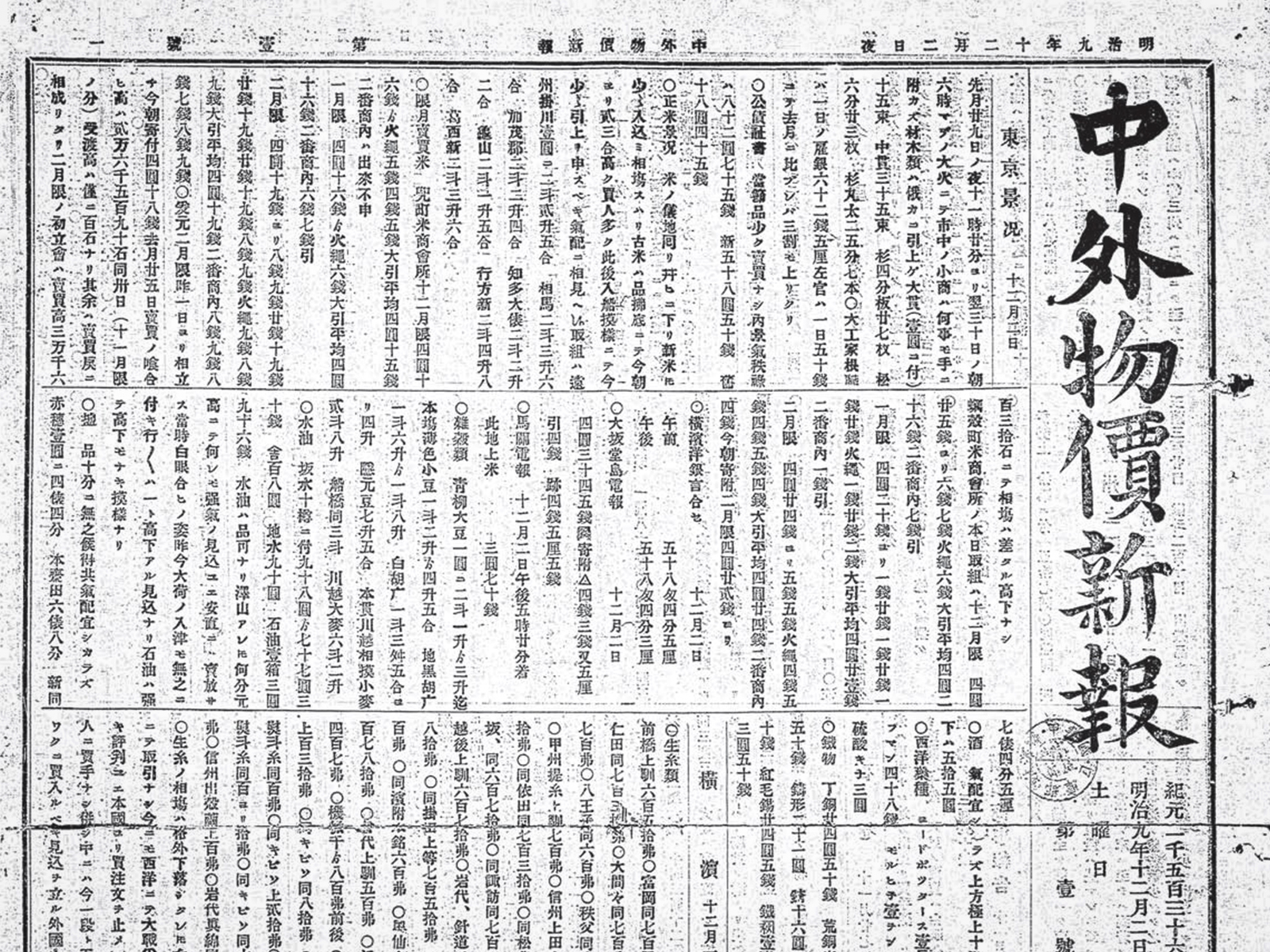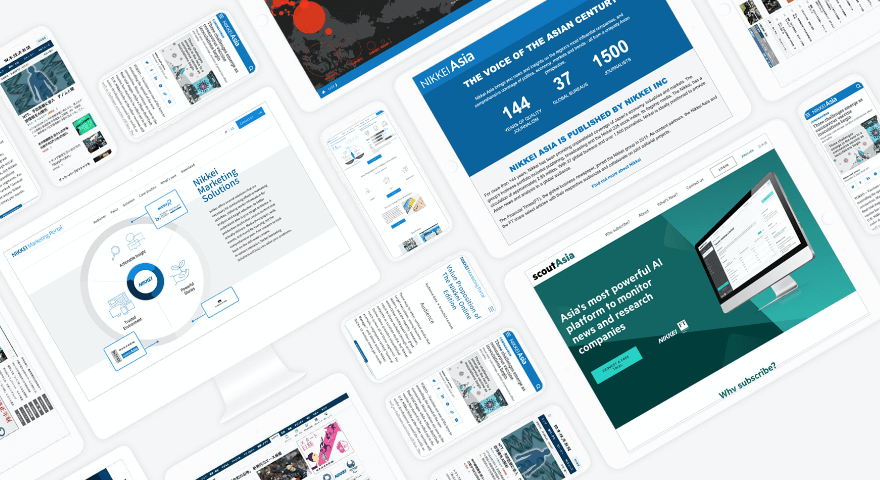- History
Our History 2: The Roots of the Nikkei - the Chugai Bukka Shimpo

The Nikkei's story begins with the first issue of the Chugai Bukka Shimpo, which was published in 1876 by Takashi Masuda, the original president of Mitsui & Co. At that time, economic information on matters such as domestic and foreign prices was collected by the Ministry of Home Affairs' Bureau of International Trade and Industry, but it was not disclosed to members of the private sector. The Director General of this body wanted to disseminate information to the business world in order to help commerce develop, and he strongly recommended that Masuda create a newspaper to spread commercial knowledge. Masuda consulted with Eiichi Shibusawa, a senior colleague of his from his days at the Ministry of Finance. Shibusawa had visited Europe at the end of Japan's Edo period and grasped the importance of distributing economic information. He strongly agreed with Masuda and promised to cooperate.
Reporting on World Price Movements from a Japanese Perspective
It was on December 2, 1876, that the first edition of the Chugai Bukka Shimpo was published. This was the origin of what was to become the newspaper now known as The Nikkei. It was less than ten years after the Meiji Restoration, and the young leaders of the new government regime were rapidly laying the foundations of modern Japan.
The central figure at the Chugai Bukka Shimpo was Takashi Masuda, who was also the first president of Mitsui & Co. As the head of a trading company, Masuda was strongly aware of the vital role played by information in commercial transactions.
"Since we have initiated diplomatic relations with the world, domestic prices have been fluctuating daily due to the movement of goods around globe and the influence of various incidents," said Masuda. "Because we lack awareness of this phenomenon, foreigners monopolize the profits of our trade. Moreover, many of the newspapers in Japan are so engrossed in politics, law and diplomacy that they neglect the real world of business. There is a need for Japanese people to report on global price movements."
Masuda consulted with Hideharu Kawase, director of the Home Ministry's Commercial Bureau, which was overseeing commercial activities. Kawase wanted to make use of the reports on domestic and foreign market conditions received by the government for business purposes, and he recommended that Masuda publish a newspaper. This led to Masuda's decision to start the Chugai Bukka Shimpo.
Masuda also took on writing duties himself. The newspaper was printed on Saturdays and published every Sunday. Subscriptions were offered at 2.40 yen per year in advance, 1.25 yen per month for six months and 5 sen per copy. Printing and delivery were conducted by Nipposha, the publisher of the Tokyo Nichi Nichi Shimbun.
The Founder of a Paper Works with the Father of Japanese Capitalism
For an incumbent president of an early-stage trading company to start publishing a newspaper, albeit a weekly one, and to write for it himself, was unheard of at the time. In those days, large newspapers that focused on politics or small papers that covered goings on about town dominated the media world. Given this backdrop, it was noteworthy for an economic newspaper that reported solely on prices and business conditions to published.
What kind of person was Takashi Masuda, who launched this unprecedented economic media venture? He was born in what is today Sado City, Niigata Prefecture, in 1848 at the end of Japan's Edo period. Masuda went to work in the city of Edo (now known as Tokyo) with his father, a government official. After the Meiji Restoration, when Masuda was 19 years old, he used his English skills to acquire work as an interpreter for a trading company in Yokohama. It was there that he became acquainted with Kaoru Inoue, Minister of Finance, and began working under him at that ministry. Masuda's connection with Inoue was of great help in the former man's successful efforts to become the president of Mitsui & Co.
Masuda developed Mitsui & Co. into a major trading company and laid the groundwork for the Mitsui Zaibatsu by managing the Miike coal mine and training his successor. He was also famous for his interests such as antiques and the tea ceremony, making quite a name for himself in the latter endeavor in particular.
Eiichi Shibusawa, sometimes called "the father of Japanese capitalism," also played an important role in the establishment of the Chugai Bukka Shimpo. Like Masuda, Shibusawa was a former vassal of the Tokugawa Shogunate (Japan's governing body before the Meiji Restoration). As Masuda's superior at the Ministry of Finance, he consulted with him on a variety of matters. He is said to have encouraged Masuda to publish the Chugai Bukka Shimpo based on his own experience visiting The London Times.
Shibusawa continued to be a good friend to Masuda, contributing articles to the Chugai Bukka Shimpo when it was later renamed the Chugai Shogyo Shimpo. He also was able to discuss the state of economic newspapers from a global perspective, given his familiarity with the British publication The Economist.
Significance for the Modern World
According to economic theory, buyers and sellers participating in a market make decisions on transactions using market prices as signals. For supply and demand to be balanced and for transactions to be concluded, it is necessary that price information be equally available to the numerous market participants.
The birth and development of the Chugai Bukka Shimpo illustrates how the media can function as an essential part of the infrastructure of a market economy by conveying unique types of information. It is for this reason that The Nikkei works to "contribute to the peaceful and democratic development of the Japanese economys" as part of its bedrock philosophy.
This mission arose from the vision of young economic voices in Japan's Meiji era (1868-1912) and it has been handed down within The Nikkei ever since. It remains unchanged even today, despite the continued and dramatic increase in the volume of information handled.
Nikkei Inc.

Our mission is to deliver useful information to businesspeople around the world through our global products. We use our extensive network in Asia to conduct in-depth research on fast-growing markets and companies. By bringing you unique perspectives and the latest economic and political news, we help you succeed in your business in Asia.
See More
